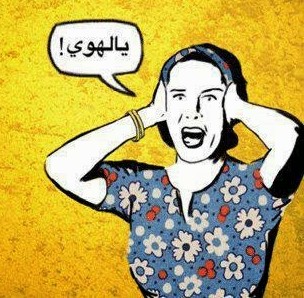 Arabs were at your service with a dramatic exclamation for every occasion long before Gen-Y coined the ever-punchy moniker “OMG” (Oh my God). Years of watching Egyptian musalsalaat (television series) revealed that, whether ghetto or high-fly, Arab affinity for hyperbole is unparalleled.
Arabs were at your service with a dramatic exclamation for every occasion long before Gen-Y coined the ever-punchy moniker “OMG” (Oh my God). Years of watching Egyptian musalsalaat (television series) revealed that, whether ghetto or high-fly, Arab affinity for hyperbole is unparalleled.
Consequently, we give you ten ways to OMG in colloquial Arabic:
1. Ya lahwy
Catch your daughter jigging school? Ya lahwy! Gunshots ring out in your neighbourhood? Ya lahwy! Your son gets less than 90 on his exam? Ya lahwy, ya lahwy, ya lahwy!
2. Ya Kharaashy
A phrase with a bit of history, ‘Ya Kharashy’ originated in honour of the very first Al-Azhar Sheikh, Mohammed Al-Kharashy, who was known for upholding truth and consistently standing in the face of oppression. Kharashy’s reputation was so firmly rooted that people began to call his name as a plea for help when they found themselves in situations of injustice. It developed from there as an exclamation used in moments of helplessness and disaster.
3. Ya dahwety
Your problem has consumed you. You can’t think straight. You feel isolated in your stress. You are drowning in the abyss of disaster. There’s only one phrase that can express your feelings of imminent meltdown, so you stretch it out and wail it. “Ya dahwetyyyyyyyy!”
4. Ya kebdy 3aleyk
The liver is not an organ ordinarily discussed over tea and biscuits, but its detoxing functions make it necessary for survival. It also happens to be the largest internal organ, lending itself to the Arab need for exaggeration.
So when you get deep and meaningful with an Arab and regale them with sob stories, chances are that they will gaze at you with wide, sad eyes and wail, “Ya kebdy 3aleyk!” Because Arabs don’t just empathise – they feel your pain in their largest, crucial internal organ.
5. Ya khabar abyad
Literally translating to “Oh white news”, this exclamation is used to express surprise upon hearing unexpected news. However, the surprised recipient is also optimistic – or potentially just superstitious – and therefore adds the “white” descriptor to express hope that the news will translate into a positive outcome of some kind.
6. Ya nhar eswed
The expression “Oh black day” caters to the more cynical and lends itself quite well to angry parents. If a child transgresses in some way they can be quite certain that the black day in reference is not befalling their parents but, rather, it is about to be inflicted by them.
There is also a ‘cleaner’ version of this phrase for the more genteel, less sweary types. Ya nhar abyad, albeit, “Oh white day”, has a similar effect to “Ya khabar abyad” as explained above.
7. Ya msebty
You know it’s really bad when an Arab mother has pulled out the ‘ya msebty’. Oh my catastrophe! Oh the calamity! Oh woe is me, woe is me, woe is me!
In keeping with the Arab love for drama, this phrase is open to creativity. “Ya msebty el sowda” adds a black touch to the catastrophe. Pairing “ya msebty” with “ya lahwy” or “ya dahwety” also adds to the tragic effect.
Iraqis use a more dire variation of this, where they wail, “Sowda 3alayyah”, meaning “blackness has descended on me”.
8. Ya maraary
Frustration is a human emotion felt all too often, but rather than growling out an “OMG”, you can comment on the sour taste that conversation left in your mouth by biting out a reference to your feelings of bitterness, or your maraar.
Alternatively, a person at maximum levels of aggravation might instead state, “Maraarty etfa2a3et”, implying that their gallbladder has exploded due to frustration. Since the gallbladder’s function is to produce bile, this phrase is, of course, a graphic way of indicating that the angry beaver’s system is now full of the very bitterness to which the original “Ya maraary” referred.
9. Wlih
More common in the Levant area of the Arab world, “Wlih” is also used in the Arab Gulf by Iraqis who address males with the variation “Wilak” and females with “Wilich”.
Wlih can be used to express anything from happy surprise to a warning indication that, as comedian Russell Peters puts it, ‘Somebody gonna get hurt real bad.’
10. Ya hasrety
Ya hasrety literally translates to “Oh my heartbreak”, but its meaning and usage encapsulates so much more. It denotes a mournful sense of loss. It’s a disappointment in opportunities lost or wasted. It covers dashed hopes for a child on whom high expectations were pinned. It conveys a resigned understanding that there’s no turning back time. All of these emotions are accompanied by an underlying ache of a sadness that will not soon be forgotten.
And if you’re thinking that the word is redundant because no human can possibly feel that many emotions at once then, on behalf of Arabs around the world, I’ma let you finish, but Hermione Granger has the best response to that of all time:
“Just because you have the emotional range of a teaspoon doesn’t mean we all have.”
Categories: Culture, Religion and Culture

Ya Allah!
Like Like
you gotta include the uuuuuuffffffffffffffffffffffffff sound!
Like Like